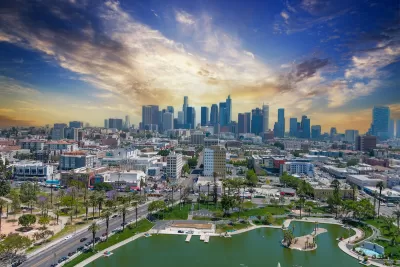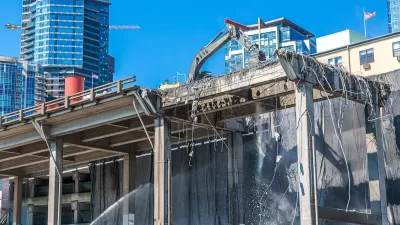Seven grant awards totaling $162 million will be used for planning, capital projects, and regional partnerships to reduce environmental harm and improve access in disadvantaged communities.

Administered by the U.S. Department of Transportation (DOT), the Reconnecting Communities and Neighborhoods (RCN) Program seeks to:
- Prioritize disadvantaged communities;
- Improve access to daily needs such as jobs, education, healthcare, food, and recreation;
- Foster equitable development and restoration;
- Reconnect communities by removing, retrofitting, or mitigating highways or other transportation facilities that create barriers to community connectivity, including to mobility, access, or economic development.
As reported by Joe Linton in this article, RCN grants totaled $237 million for California. Of that, L.A. County secured about two-thirds: $162 million. Over 90 percent of this funding goes to Metro, nearly all of that for one $139 million grant to fund 14 miles of bus priority lanes, 23 miles of bus corridor enhancements (i.e. transit signal priority, all door boarding, and bus shelters), 60 Metro Bike Share stations plus first-last-mile improvements, and five mobility hubs.
Three of the grants for L.A. County seek to reconnect and/or expand parkland, including:
- $800,000 to L.A. County for the Reconnecting East Los Angeles: 60 Green Bridge Project for Belvedere Park - planning. The county will plan for a cap to be developed over the 60 Freeway bridging the two sides of Belvedere Park, near the East L.A. Civic Center, the current terminus of the Metro E Line.
- $2 million to L.A. City for Reconnecting MacArthur Park - planning. Championed by L.A. City Councilmember Eunisses Hernandez, this project would plan for permanently closing Wilshire Boulevard from Alvarado Street to Carondelet Street and bridging the two sides of MacArthur Park.
- $3.6 million to Friends of Hollywood Central Park (FHCP) for Healing Hollywood - planning. The nonprofit organization FHCP is planning a large scale (37.6 acre) park capping the 101 Freeway, which will include five miles of walk/bike paths and more.
For more information, please read the source article.
FULL STORY: Rundown of New Federal Reconnecting Communities Grants for L.A. County

Maui's Vacation Rental Debate Turns Ugly
Verbal attacks, misinformation campaigns and fistfights plague a high-stakes debate to convert thousands of vacation rentals into long-term housing.

Planetizen Federal Action Tracker
A weekly monitor of how Trump’s orders and actions are impacting planners and planning in America.

Chicago’s Ghost Rails
Just beneath the surface of the modern city lie the remnants of its expansive early 20th-century streetcar system.

Bend, Oregon Zoning Reforms Prioritize Small-Scale Housing
The city altered its zoning code to allow multi-family housing and eliminated parking mandates citywide.

Amtrak Cutting Jobs, Funding to High-Speed Rail
The agency plans to cut 10 percent of its workforce and has confirmed it will not fund new high-speed rail projects.

LA Denies Basic Services to Unhoused Residents
The city has repeatedly failed to respond to requests for trash pickup at encampment sites, and eliminated a program that provided mobile showers and toilets.
Urban Design for Planners 1: Software Tools
This six-course series explores essential urban design concepts using open source software and equips planners with the tools they need to participate fully in the urban design process.
Planning for Universal Design
Learn the tools for implementing Universal Design in planning regulations.
planning NEXT
Appalachian Highlands Housing Partners
Mpact (founded as Rail~Volution)
City of Camden Redevelopment Agency
City of Astoria
City of Portland
City of Laramie





























